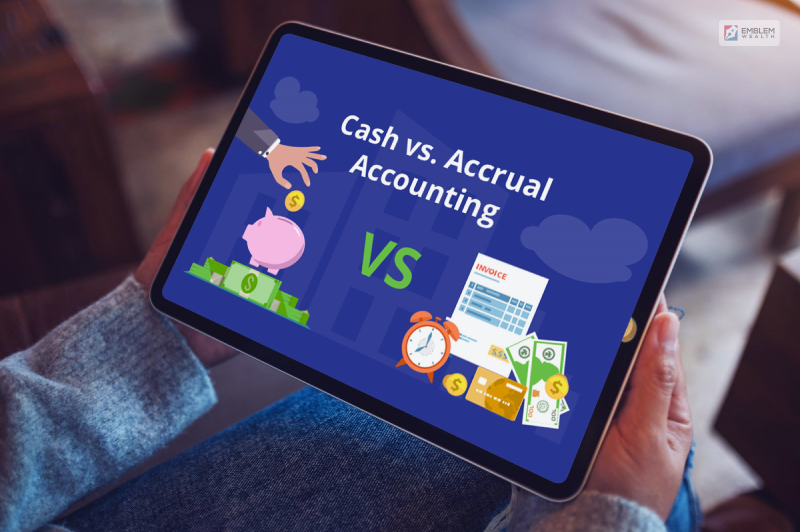Cash Vs Accrual: Which One Is the Secret Behind Your Financial Success?

The key difference between cash vs accrual accounting is the main timing of expenses and revenue recognition.
The cash method offers a direct recognition of the costs and the revenues, whereas the accrual accounting method focuses on the anticipated expenses and income.
In this article, we shall explore the differences and learn how each accounting method affects a company’s accounting decisions and why the accrual basis of accounting is generally preferred over the cash basis.
So, without any further delay, let us begin.
Key Takeaways
The accrual method of accounting records the revenues and the expenses when a transaction takes place, but that happens before dispensing or receiving the fund.
Cash-based accounting records the revenues and costs when the fund related to the transactions is dispensed or received.
The accrual accounting method offers a more defined and accurate view of the health of a company by including the accounts receivable and accounts payable.
The accrual method is preferred by more prominent companies, particularly those that conduct public trade. This is because it helps smooth out the earnings as time passes.
Smaller businesses or sole proprietors are the primary users of the cash method.
What Is Accrual Accounting?
Under this process of accounting, the entire revenue is mainly accounted for by the earnings. Unlike the cash accounting method, the accrual method keeps track of the revenue when a service or product reaches a customer with the expectation that they will pay money in the future.
In simple terms, accrual accounting accounts for the money before the business actually receives it. Likewise, the expenses for the goods or services are recorded before any of the cash is paid out for them.
What Is Cash Basis Accounting?
While following this method, the revenue reports on the income statement only when the cash comes through. Similarly, the business records the expenses when the money moves out. The cash method is generally used by smaller companies or for personal finances.
The key characteristics of cash basis accounting include:
Simplicity: The cash basis accounting is a relatively straightforward method. It is suitable for small businesses and individuals.
Focus on cash flow: Cash basis accounting helps you to get a clear picture fo the cash position of the business.
Delayed Recognition: The expenses and revenues may not recognized in the same period as they occur under the accrual accounting.
Cash Vs. Accrual Accounting: Key Differences
The theoretical definitions of each of the accounting techniques are pretty simple. Let us now focus on the critical differences between the cash vs accrual accounting methods.
Accrual Method
The accrual accounting methods record the account’s payables and receivables. As a result, it paints a more accurate picture of a company’s profitability, mainly in the long term.
For instance, a company that has sales in the current quarter will not record it using the cash accounting method. They also expect the related revenue in the following quarter. An investor may think that a company is not capable of generating profit when, in reality, the company is really doing well.
The accrual method does not keep track of the cash flow. A company might seem profitable in the long term, but it actually has a challenging, significant shortage of cash in the short term.
Another disadvantage of accrual accounting is that it may be more complicated as it’s necessary to account for items like unearned revenues or prepaid expenses. It may also require an addition of staff.
The accrual method is for those companies that file their audit statements and operate under the GAAP principles that the Financial Accounting Standards Board issues.
Cash Basis Method
The primary advantage of the cash method is its simplicity. It just accounts for the cash received or paid. Tracking the cash flow of a company is also far more accessible.
It is beneficial to sole proprietorships and other small businesses as, in most likelihood, it will not require any extra staff to use.
However, the cash method may overstate the health of a company that is rich in cash. That is because it does not record the accounts payable, which might exceed the cash on the books and the current revenue stream of the company.
As a result, an investor may conclude that a company is making a profit when, in reality, the company is facing financial difficulties.
The GAAP rules do not accept the cash method of accounting.
The Comparison Between Accrual And Cash Accounting
In this section, I will discuss the significant differences between Accrual and cash accounting
|
Feature |
Accrual Accounting |
Cash Basis Accounting |
|
Revenue Recognition |
Recognized when earned, regardless of when cash is received |
Recognized when cash is received |
|
Expense Recognition |
Recognized when incurred, regardless of when cash is paid |
Recognized when cash is paid |
|
Matching Principle |
Matches expenses with the revenue they help generate |
No matching principle |
|
Financial Reporting |
Provides a more accurate picture of a company’s financial performance |
It may not accurately reflect financial performance |
|
Complexity |
More complex |
Simpler |
|
Suitable for |
Larger businesses, businesses with significant inventory or long-term contracts |
Smaller businesses, individuals |
Cash Vs Accrual Accounts: Special Considerations
The accrual method is a lot more commonly used method, mainly due to the public-traded businesses. The key reason for the popularity of the accrual method is that it smooths out the earnings over time. It also accounts for all the expenses and revenues they generate. The cash method records these only when there is an exchange of cash and presents fluctuating views of profitability.
For instance, using the cash method, retailers appear profitable in Q4 as consumers purchase for the holiday season. However, they would look unprofitable in the Q1 of next year as consumer spending reduces after the holiday rush.
Each of the methods has its own advantages and disadvantages. Each of them provides different pictures of a company’s financial health. Investors need to understand the impact of both methods when they make any investment decisions.
Cash Vs. Accrual Accounting Examples
Imagine you work for Tata Motors, which sells machinery. If you are selling $5,000 worth of machinery using the cash method, you will not record the amount in the books until you have the money from the customers in hand or receive a check.
However, using the accrual method, you’ll record the $5,000 as revenue for the date of the sale. Though, you might receive the amount days, weeks, or perhaps months later.
Important Tips On Cash Basis Accounting
Cash accounting always offers a very simplified approach to tracking income and expenses. However, to avoid pitfalls, you can use these crucial tips on cash basis accounting:
Maintain accurate records: keep a detailed record of all the cash inflows and outflows. This must include invoices, bank statements, and receipts.
Try to separate the personal and business finances: Always maintain separate accounts for your personal and business finances. This will help you to avoid major confusion while ensuring accurate reporting.
Seek professional advice: If you feel like you are unsure about cash-based accounting or facing complexities in financial situations, then you must consult with a tax professional or an accountant for the utmost guidance.
Cash Basis Accounting: The Pros And Cons
As we have learned, cash-based accounting is a simplified method that records incomes and expenses. The cash basis accounting comes with various advantages and disadvantages. Let’s learn about them!
Pros:
Cash accounting is simple and easy to understand.
You can get a clear picture of inflows and outflows.
Cash accounting is ideal for all kinds of small businesses.
Cons:
The cash basis accounting provides a comprehensive view of financial health.
This type of accounting may not be suitable for such businesses which have significant inventory or long-term contracts.
To Conclude,
Cash vs accrual accounting are two of the most popular accounting methods in any business. They have their own benefits and drawbacks. Every businessman should be aware of them before choosing to follow either of the methods.
While the accrual method records the amounts before the payment is made, the cash-based method will do so once you have the cash in hand.
These two types of accounting have distinctive purposes and are used accordingly by different types of companies. Whichever method you choose, you must have an accurate understanding of your business type and the accounting styles, too.
Continue Reading:


























Leave A Reply